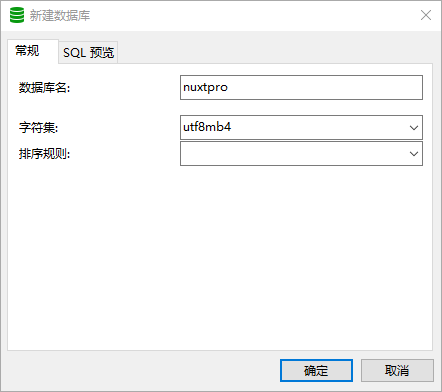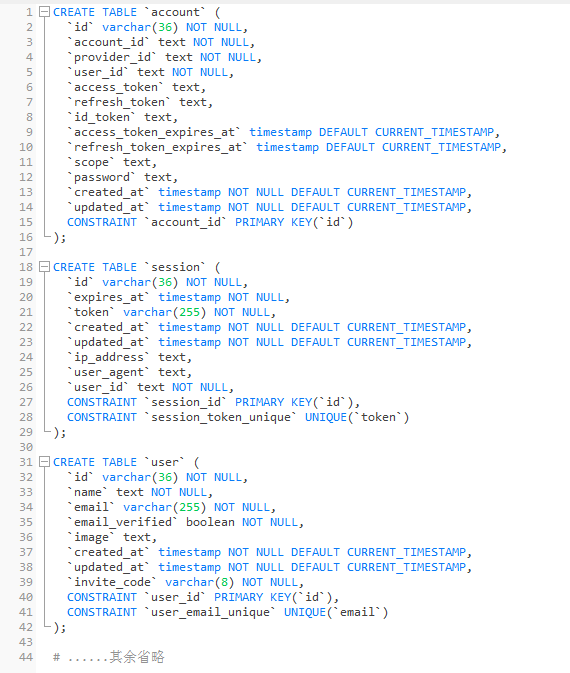数据库
在NuxtPro项目中均使用 DrizzleOrm 作为主要的orm框架,能够支持像mysql、pgsql等常见的数据库类型。
这里以mysql作为案例,讲述NuxtPro中的配置流程:
数据库配置
1、项目中mysql的配置
在NuxtPro项目中,无论是用户端还是后台端中,都仅需在环境变量env中配置1行参数即可实现与mysql的无缝对接,简单快捷。
bash
DATABASE_URL=mysql://用户名:密码@mysql地址:端口/数据库 # mysql数据库连接地址2、orm框架针对mysql的配置
在NuxtPro项目中,找到config文件夹,里面包含着针对mysql数据库的映射对应关系。后续如需切换其他数据库,只需将方言dialect 修改成对应的数据库即可。
bash
import type { Config } from 'drizzle-kit';
export default {
dialect: 'mysql',
schema: './server/database/schema.ts',
out: './server/migrations',
dbCredentials: {
url: process.env.DATABASE_URL!
},
} satisfies Config;随后在server->database文件夹下,调整database.ts参数为对应mysql的驱动连接即可。其他数据库连接方式同样。
bash
import { drizzle } from 'drizzle-orm/mysql2';
import mysql from 'mysql2/promise';
import * as schema from './schema';
const connection = mysql.createPool(process.env.DATABASE_URL!);
export const db = drizzle(connection, { schema, mode: 'default' });3、navicat中mysql建库建表
为了更简单高效的实现对mysql的建库建表操作,这里不采取自带的migrations迁移方式。而是采用更为直接的navicat中执行sql脚本的形式。
a).新建数据库

b).执行建表语句
您可以直接将server->migrations文件夹下的db.sql文件中的内容复制粘贴到navicat的sql执行栏。也可通过导入的形式直接导入db.sql到刚刚新建的nuxtpro数据库中

c).CRUD操作基础案例
以下为drizzle-orm操作基础案例,具体操作详情可参考官方文档 DrizzleOrm
bash
import { category } from "@/db/schema";
import { db } from "@/db";
import { and, desc, eq } from "drizzle-orm";
export enum CategoryStatus {
Created = "created",
Deleted = "deleted",
Online = "online",
Offline = "offline",
}
export async function insertCategory(
data: typeof category.$inferInsert
): Promise<typeof category.$inferSelect | undefined> {
const [category] = await db().insert(category).values(data).returning();
return category;
}
export async function updatecategory(
uuid: string,
data: Partial<typeof category.$inferInsert>
): Promise<typeof category.$inferSelect | undefined> {
const [category] = await db()
.update(category)
.set(data)
.where(eq(category.uuid, uuid))
.returning();
return category;
}
export async function findCategoryByUuid(
uuid: string
): Promise<typeof category.$inferSelect | undefined> {
const [category] = await db()
.select()
.from(category)
.where(eq(category.uuid, uuid))
.limit(1);
return category;
}
export async function findCategoryBySlug(
slug: string,
locale: string
): Promise<typeof category.$inferSelect | undefined> {
const [category] = await db()
.select()
.from(category)
.where(and(eq(category.slug, slug), eq(category.locale, locale)))
.limit(1);
return category;
}
export async function getAllCategory(
page: number = 1,
limit: number = 50
): Promise<(typeof category.$inferSelect)[] | undefined> {
const offset = (page - 1) * limit;
const data = await db()
.select()
.from(category)
.orderBy(desc(category.created_at))
.limit(limit)
.offset(offset);
return data;
}
export async function getCategoryByLocale(
locale: string,
page: number = 1,
limit: number = 50
): Promise<(typeof category.$inferSelect)[] | undefined> {
const offset = (page - 1) * limit;
const data = await db()
.select()
.from(category)
.where(and(eq(category.locale, locale), eq(category.status, CategoryStatus.Online)))
.orderBy(desc(category.created_at))
.limit(limit)
.offset(offset);
return data;
}
export async function getCategoryTotal(): Promise<number> {
const total = await db().$count(category);
return total;
}